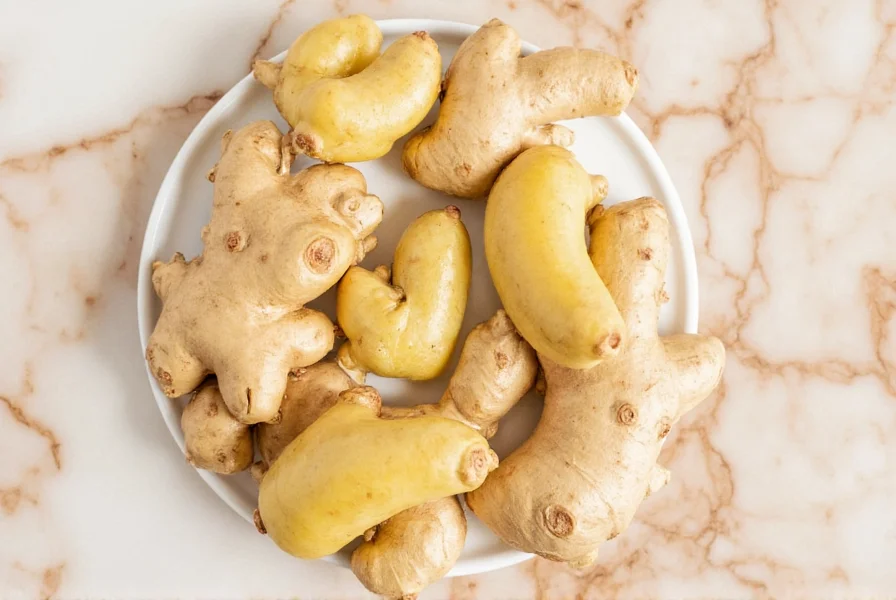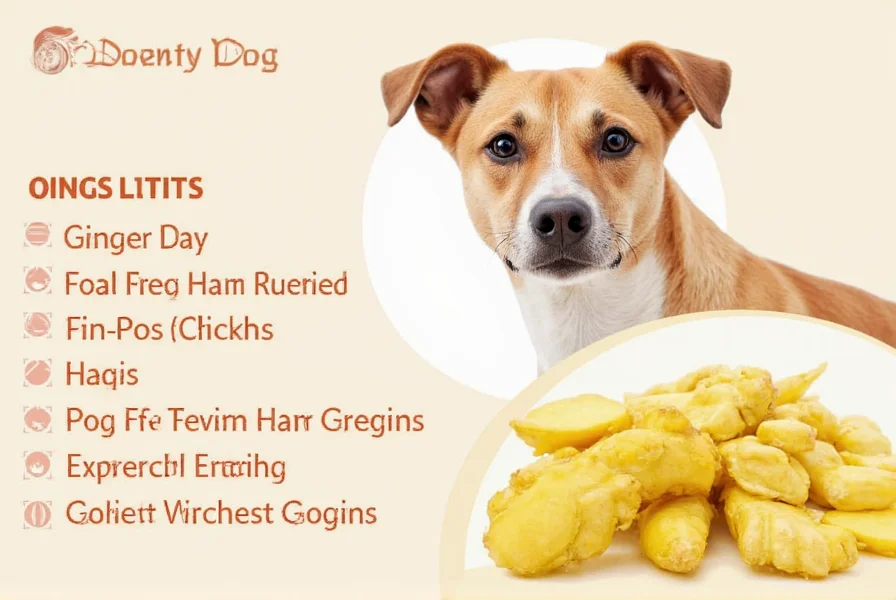Many pet owners seek natural remedies to support their dogs' health, and ginger has gained attention for its potential therapeutic properties. As a centuries-old medicinal root used in human wellness, ginger's active compounds like gingerols and shogaols offer anti-inflammatory and antioxidant benefits that may translate to canine health when administered properly.
Scientific Basis of Ginger for Canine Health
Research on ginger's effects in dogs remains limited but promising. Studies on human and animal models demonstrate ginger's ability to reduce nausea and vomiting by affecting gastrointestinal motility and gastric emptying. A 2018 study published in the Journal of Veterinary Pharmacology and Therapeutics found ginger extract significantly reduced motion sickness symptoms in dogs during simulated car travel. The root's anti-inflammatory properties may also benefit dogs with arthritis or joint pain, though more species-specific research is needed.

Documented Benefits of Ginger for Dogs
Ginger offers several potential health advantages for dogs when used appropriately:
- Nausea and motion sickness relief - Particularly helpful for dogs prone to car sickness
- Digestive support - May alleviate mild indigestion and promote healthy gut motility
- Anti-inflammatory effects - Could provide joint comfort for senior dogs
- Antioxidant properties - Helps combat oxidative stress at the cellular level
- Circulation improvement - May support cardiovascular health in moderation
Safety Considerations and Potential Risks
While ginger for dogs with motion sickness is generally well-tolerated, certain precautions are essential. Dogs with bleeding disorders should avoid ginger as it may increase bleeding risk. Diabetic dogs require veterinary supervision since ginger can affect blood sugar levels. Excessive ginger consumption may cause:
- Oral irritation or burning sensation
- Gastrointestinal upset including diarrhea
- Increased heart rate in sensitive individuals
- Potential interactions with blood thinners or diabetes medications
Proper Ginger Dosage for Dogs
Determining the correct ginger powder for dogs dosage depends on your pet's weight and health status. The following table provides general guidelines for safe administration:
| Dog Weight | Fresh Ginger | Ginger Powder | Frequency |
|---|---|---|---|
| Under 10 lbs | 1/8 teaspoon grated | Pinch (1/16 tsp) | Once daily max |
| 10-25 lbs | 1/4 teaspoon grated | 1/8 teaspoon | Once daily max |
| 25-50 lbs | 1/2 teaspoon grated | 1/4 teaspoon | Once daily max |
| Over 50 lbs | 1 teaspoon grated | 1/2 teaspoon | Once daily max |
Never exceed these amounts, and discontinue use if your dog shows adverse reactions. For ginger tea for dogs, steep 1/4 teaspoon of grated ginger in 4 ounces of hot water, then cool completely before offering 1-2 teaspoons to small dogs or up to 1/4 cup for larger breeds.

Administration Methods for Optimal Results
Introducing ginger to your dog's diet requires careful preparation. The most effective methods for giving ginger to dogs include:
- Mixed with food - Blend small amounts of fresh grated ginger into meals
- Ginger tea - Cool infusion added to water bowl (limited to 24-hour use)
- Homemade treats - Incorporate minimal amounts into dog-friendly recipes
- Capsules - Only under veterinary guidance for precise dosing
Avoid giving dogs ginger in candy form, gingerbread, or other human preparations containing toxic ingredients like xylitol, nutmeg, or excessive sugar. Always start with the lowest possible dose to assess tolerance before increasing.
When to Consult Your Veterinarian
While ginger for dogs with arthritis may provide complementary support, it should never replace prescribed treatments. Consult your veterinarian before using ginger if your dog:
- Has a bleeding disorder or upcoming surgery
- Takes medications like anticoagulants or insulin
- Experiences chronic vomiting or diarrhea
- Shows signs of mouth irritation after ginger consumption
- Has diabetes or other metabolic conditions
Your veterinarian can help determine if ginger aligns with your dog's specific health needs and current treatment plan. They may also suggest alternative natural remedies if ginger isn't appropriate for your pet.
Recognizing Ginger Overconsumption
While rare, ginger toxicity can occur with excessive intake. Watch for these signs that your dog has consumed too much ginger:
- Excessive drooling or pawing at mouth
- Vomiting or diarrhea lasting more than 24 hours
- Lethargy or unusual weakness
- Increased thirst and urination
- Abnormal heart rate or breathing
If you notice these symptoms after giving your dog ginger, contact your veterinarian immediately. Most cases resolve with supportive care, but professional guidance ensures proper management.
Frequently Asked Questions
Can I give my dog fresh ginger root directly?
While dogs can consume small amounts of fresh ginger, it's best to grate or mince it first. Whole ginger root may cause choking or digestive discomfort. Always start with tiny amounts (1/8-1/4 teaspoon for small dogs) mixed into food to assess tolerance.
How long does it take for ginger to help with dog nausea?
Ginger typically begins working within 30-60 minutes when given before travel or anticipated nausea triggers. For best results with motion sickness, administer ginger 30 minutes before car rides. Effects usually last 4-6 hours, so multiple doses may be needed for longer journeys.
Is ginger safe for puppies?
Puppies have more sensitive digestive systems, so ginger should be used with extreme caution. Consult your veterinarian before giving ginger to puppies under 6 months old. If approved, use only minimal amounts (1/16 teaspoon or less) and monitor closely for any adverse reactions.
Can ginger interact with my dog's medications?
Yes, ginger may interact with certain medications including blood thinners, diabetes drugs, and some heart medications. Ginger can enhance the effects of anticoagulants and affect blood sugar levels. Always consult your veterinarian about potential interactions before introducing ginger if your dog takes any prescription medications.
How should I store homemade ginger treats for dogs?
Store ginger-infused dog treats in an airtight container in the refrigerator for up to one week. For longer storage, freeze individual portions in freezer bags for up to three months. Always check for mold or spoilage before serving, and discard any treats that develop off odors or textures.











 浙公网安备
33010002000092号
浙公网安备
33010002000092号 浙B2-20120091-4
浙B2-20120091-4